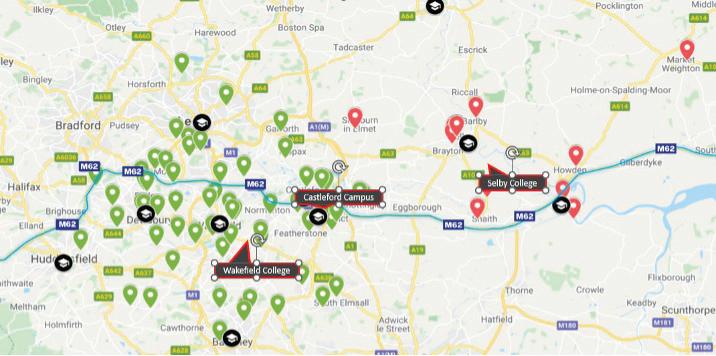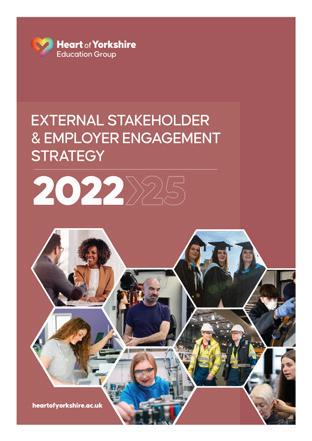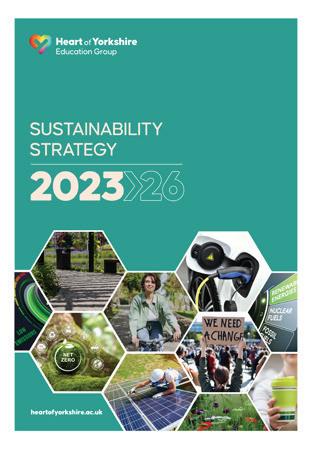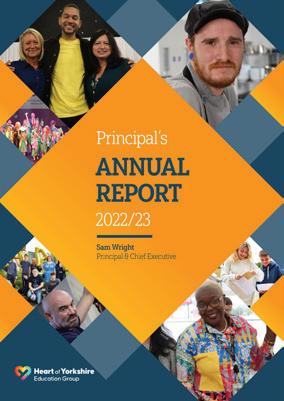


















AI Artificial Intelligence
CA Combined Authority
CEIAG Careers Education Information Advice & Guidance
CPD Continuing Professional Development
DFE Department for Education
DWP Department for Work & Pensions
EDI Equality, Diversity and Inclusion
ERB Employer Representative Body (lead body for LSIPs)
ESFA Education & Skills Funding Agency
EUAC The Alliance for Sustainability Leadership in Education
FE Further Education
GVA Gross Value Added
HE Higher Education
HEY Humberside & East Yorkshire
HLA Higher Level Apprenticeship
IT Information Technology
JCP Job Centre Plus
JISC UK Digital, Data & Technology Agency (focused on tertiary education, research and innovation)
KPI Key Performance Indicators
LA Local Authority
LCR Leeds City Region
LEP Local Enterprise Partnership
LSIF Local Skills Improvement Fund (funding to support the delivery of LSIPs)
LSIP Local Skills Improvement Plan
NY North Yorkshire
STEAM Science Technology Engineering Arts and Maths
UNESCO United Nations Educational, Scientific and Cultural Organisation
VR Virtual Reality
WY West Yorkshire
WYCA West Yorkshire Combined Authority
XR eXtreme Runtime (XR technologies include include Virtual Reality (VR), Augmented Reality (AR), and Mixed Reality (MR) hardware and software)
Y&NY York & North Yorkshire
YLP Yorkshire Learning Providers (a network of training organisations operating across Yorkshire)

As part of the Skills & Post 16 Education Act 2022 and section 52B of the Further and Higher Education Act, FE colleges have a duty to review their contribution to meeting skills needs – at a local level, but also at a regional and national level, with a view to ensuring individuals secure employment
Our planning and provision reflect and articulate the longerterm strategic outcomes and actions arising from the new Local Needs Duty This is at the core of our Group strategic planning, our curriculum and skills provision planning and our strategic aims, measures and target setting.
Alongside our new five-year Group Strategic Plan, this Annual Accountability Statement aims to be a relatively concise public statement of our key aims, targets and outcomes for the year ahead
With three colleges in West and North Yorkshire, together forming the Heart of Yorkshire Education Group, we are committed to delivering the skills needed by our local communities and the wider Yorkshire region, to make a positive contribution to the economy and, ultimately, to people’s lives
Our aspiration is to deliver excellence in everything we do Through the delivery of our new Strategic Plan 2025-30 and supporting strategies, we believe we will be in the best position to continuously improve and be able to deliver on the Government’s skills agenda and regional and local priorities
Underpinning our strategy is our Vision, our Mission and our Values, all of which we developed in conjunction with our staff and stakeholders. As part of our new strategic planning process, we have reviewed them, and we believe they are still absolutely right to take us into a new era and demonstrate our passion and commitment

Quite simply, our vision outlines what we are aiming for in the future, in terms of our long term goals:-
“To be an inspiring, first-choice education group, passionately serving all of our communities.”
Our Mission describes why we are here, our purpose and what we do, which is:-
“We positively transform our students’ lives and the communities we serve by putting them at the heart of everything we do.”

Our values act as the moral compass for our organisation They encapsulate the way we do things, how we behave and how we make our decisions +
Collaboration Ambition Inclusion Respect
Our People at the heart of everything we do
Within our Strategic Plan 2025-30, we have determined four new Strategic Goals (SGs) that we are committed to delivering –
SG1 – Developing skills and knowledge for the future
SG2 – Delivering transformative outcomes
SG3 – Nurturing inclusion and belonging
SG4 – Being future-focused, resilient and sustainable
Each of these Strategic Goals has rigorous supporting objectives that will ensure impact, with clear outcomes and key performance indicators behind them that we will monitor and achieve
Furthermore, we have detailed underpinning strategies and plans that will facilitate the delivery of our ambitions These are regularly reviewed by Governors and updated
The aims and objectives outlined within this Annual Accountability Statement 2025-26 are aligned to and support the delivery of the Strategic Goals and the supporting objectives outlined within our new Strategic Plan 2025-30
Our curriculum intent is to offer the right skills for now and for the future through innovative, relevant courses and qualifications – right for the
region, for jobs for our learners and employers We are working with our local and regional partners to do this, to improve our economy and meet our Local Needs Duty
In working with our key stakeholders and our employer partners, we aim to develop flexible, relevant programmes that, wherever possible, are bespoke to their needs and right for the workplace, including blended learning approaches
With our Group of three colleges, we serve a wide area across Yorkshire Castleford College and Wakefield College are based in the Wakefield District, within the West Yorkshire Combined Authority (WYCA) region Selby College is based in the new North Yorkshire Council, and the York and North Yorkshire Combined Authority (Y&NY CA) In addition, Selby College serves communities and learners within the Humberside and East Yorkshire (HEY) LEP area, East Riding of Yorkshire, and also has some learners in the WYCA area We have established strong relationships with all feeder schools in our local areas

West Yorkshire (WY) is an internationally significant economy with a GVA of £66 billion – larger than many EU countries It has a population of 2 4million, a workforce of 1 2 million people and almost 100,000 businesses It hosts the largest cluster of higher education institutions outside the capital, with seven universities producing world-leading research and 35,000 skilled graduates each year
It also has a fast-growing young population, with more people aged under 20 than any other area of the North The population is diverse with 23% of people coming from ethnic minority backgrounds (18% nationally) WY remains one of the leading locations in the UK for foreign and direct investment, according to the Ernst & Young Annual Attractiveness Survey, with significant interest in the digital and business services sectors
Deprivation¹
Level 4+ Attainment
Level²
Unemployment (Jan 24 – December 24)²
Asylum Seekers in Receipt of LA Support (December 24)³


54th most deprived district in England out of 317
28 8% of residents are qualified at level 4 or above (national average – 47 6%)
2 8% of working age population (Great Britain – 3 8%)
723 (0 6% of total number of asylum seekers in receipt of LA support; 0 2% of district’s population)
Strengths:
Significant engineering and manufacturing base employing 117,000 people (well above the national average), representing one of the largest manufacturing bases in the UK and generating £7 billion a year, or 9 4% of the region’s economic output
+ The number of manufacturing jobs in Wakefield is 72% above the national average and the number of jobs within transport and storage is 164% above the national average
+ A leading hub for financial, professional and businesses services contributing £21 3 billion GVA and employing over 300,000 people UK’s second centre for banking, over 44,000 are employed in major banks and building societies
+ From 2019 to 2024, jobs increased by 5 3% in 4 Yorkshire and The Humber County/Unitary Authorities from 1,064,128 to 1,120,806 This change fell short of the national growth rate of 5 4% by 0 1%
+ Strategically important geographical location - access to the M62, M1 and fast TransPennine rail brings the potential of a 4 million workforce, 250,000 businesses and a £160bn economy
Challenges:
Large number of vacancies across WY Job postings in March 2025 were 57% higher than in March 2020, although down from their peak in July 2023 when vacancies were 59% higher than they are currently
+ In WY higher number of people claiming out-of-work benefits than the national average – 5% versus 3 7%
+ WY has higher than average number of economically inactive people –23 2% as opposed to 21 4% nationally
+ Wakefield has fewer highly paid jobs (2020 SOC Major Group 1–3) than the national average – 48 2% and 53 4% respectively
+ In Wakefield, too many people are employed in low-skilled, elementary occupations – 2% over the national average (11 7% vs 8 8%)
+ In West Yorkshire, only 41 3% of the working-age population possess qualifications at level 4 or above, as compared to the national average of 47 6% (as of Dec 2023)
+ In Wakefield, only 28 8% of the working-age population have a level 4 or above qualification
+ Skills shortages reported by many sectors and businesses across the region, particularly in relation to high-level skilled jobs
+ According to the West Yorkshire Business Survey 2024, “availability of skilled labour” was identified as the second barrier to growth in the next three years, with around 14% of all businesses reporting this issue



+ Health & Social Care
+ Engineering & Advanced
+ Manufacturing
+ Financial & Professional Services
+ Low Carbon
+ Digital & Technology
+ Creative Industries
+ Construction
+ Logistics & Transport/Distribution
+ Education
Themes:
+ Net Zero Transition / Sustainability
+ STEAM
+ Transferable Skills
+ Equality, Diversity & Inclusion
+ Leadership & Management
+ Digitisation & Automation
Castleford College is primarily home to skills-based courses in areas including construction, hair and beauty, engineering and automotive studies It is 11,153 m2 and purpose-built facilities include:
+ Engineering labs covering mechanical and electrical pathways
+ Construction workshops with dedicated working bays for students and apprentices studying a range of disciplines including joinery, brickwork, plumbing and electrical installation A new Construction Centre funded by the DFE will be launched in September 2025 and will deliver an additional 1,250 m2 of space
+ Multiple car service lifts and a spray booth for automotive students and apprentices
+ Hair and beauty salon teaching and learning spaces, also open to the public
+ Open plan learning resource centre at the heart of the campus
Wakefield College has grown its footprint over recent years and seen significant investment to ensure students learn in a modern, state of the art environment It is 21,316 m2 and facilities include:
+ The Seacole building – a dedicated HE centre and home to the University Centre at Wakefield College The facility features a 90seat lecture theatre and flexible teaching and learning rooms
+ The Radcliffe Building – spread over four floors, the Radcliffe Building is home to a number of different course areas and also boasts the Digital Industries Centre
+ Harrison building – home to the Sixth Form Learning Resource Centre
+ The Beaumont building, refurbished and opened in 2019 and home to the award-winning Gaskells Restaurant
+ The Gissing building – a hub of activity for the creative industries and location for the School of Popular Music
+ The Waterton building, located on Wood Street and home to Performing Arts provision Boasting a 160-seat performance theatre alongside several performance studios



North Yorkshire (NY) is the largest county in terms of area in England York & North Yorkshire Combined Authority came into existence on 1st February 2024, with a newly elected mayor in May 2024 Outside of York the region is largely rural with a population density of 77 people per km2, 358 people per km2 lower than England’s 435 people per km2 NY is the 23rd County in England (of 24 total) when ordered by population density The region generates £19 2 billion GVA and has a total population of 830,000 people The claimant count for out-ofwork benefits is low in the region at only 2 3% as compared to 3 8% nationally The region has four universities and 40,000 businesses The region has low diversity with 92 8% (York) and 96 2% (NY) of residents identifying as white as compared to 81 7% nationally
Deprivation¹
Level 4+
Attainment Level²
Unemployment (Jan 24 –December 24)²
Asylum Seekers in Receipt of LA Support (December 2024)³
246th most deprived district in England out of 317
48 6% of residents are qualified at level 4 or above (national avg – 47 6%)
2% of working age population (Great Britain – 3 8%)
0
+ Strong manufacturing Sector: Approximately 22 4% of all jobs in Selby are in manufacturing, significantly higher than the national average of 7 6%
+ Highly Paid Jobs (SOC Major Groups 1–3): Around 56 8% of jobs in Selby fall into these higher-skilled categories, compared to the national average of 53 4%
+ Accommodation and Food Services: This sector is one of the largest in North Yorkshire, accounting for 12 7% of employment in the area, above the national average of 8%
+ York and North Yorkshire Economic Growth Strategy 2024–2029 indicates that Selby has a notably high concentration of agri-tech employment, approximately seven times higher than the national average
+ STEAM Sector in York: Science, Technology, Engineering, Arts, and Mathematics (STEAM) professional occupations account for 11% of all roles in York
+ Unemployment Rate: Selby has a lower than national average unemployment rate at 2%, compared to the national average of 3 8%
+ Economic Inactivity: Approximately 20 3% of the working-age population in Selby is economically inactive, slightly below the national average of 21 4%
+ Average Salary: The average salary in Selby is relatively high at £34,250, compared to £32,500 in West Yorkshire



+ Ageing population, which is an issue across the UK, is a more acute problem in York and North Yorkshire with 25% (nationally 18 7%) of the population over the age of 65 and 14 5% reaching retirement age (between the ages of 55-64 with the national average being 12 7%)
+ Rurality and low population density of the region creates problems with recruitment and training due to distance and limited transport links (both roads and public transport)
+ Low population growth – NY’s current population growth rate is 0 6%, 0 4% lower than England and Wales’s current population growth rate of 1% This coupled with a faster than average ageing population makes recruitment more difficult.
+ Low average wage per job - £32K as compared to £32 5K in West Yorkshire and £37 4K nationally This is in stark contrast to the high percentage of the working age population with level 4 and above qualifications – residents find it hard to gain employment where pay is commensurate with their educational attainment.
+ Digital and Technology
+ Agri-Skills
+ Engineering & Advanced Manufacturing (including Rail)
+ Construction
+ Health & Social Care
+ Visitor Economy
Themes:
+ Low Carbon
+ Innovation
+ Green Skills
+ Emerging Technology
+ Rurality
Selby College occupies a site of approximately 18 6 acres comprising 9 4 acres of built-up campus and 9 2 acres of sports and playing fields It is 17,177 m2 and facilities encompass some of the latest teaching aids and technology, aimed at helping our learners to progress, including:
+ Impressive construction workshops
+ Following a £600k investment in its Engineering facilities, the College now has a state-of-the-art manufacturing facility on campus, as part of its role within the Yorkshire and Humber Institute of Technology
+ Professional hair and beauty and beauty therapy salons and a spa
+ A fully equipped sports hall and gym
+ An award-winning restaurant which is equipped with fully functioning kitchens and a licensed bar
Our strategic planning processes and the development of this Annual Accountability Statement have been informed by national priorities, confirmed in the DFE’s Meeting Skills Needs: Guidance on Accountability Agreements 2025 to 2026 and the Local Needs Duty (published January 2025) –
These national skills priorities take into account the Skills England report, Industrial Strategy Priorities and Plan for Change and are areas with high volumes of vacancies which are expected to increase; long-term structural barriers to recruitment, retention, and progression issues; and are important in providing opportunities for employment in key growth areas such green jobs and net zero, creative industries and science and technology (including AI and quantum computing)
These sectors are:
+ Advanced Manufacturing
+ Creative Industries
+ Defence
+ Digital and Technologies
+ Financial Services
+ Life Sciences
+ Professional and Business Services
+ Clean Energy Industries
+ Construction
+ Health
In addition, we have determined the priorities identified within key regional and local strategies and documents
For Castleford and Wakefield Colleges, this includes –
+ WY Local Growth Plan (December 2024)
+ WY Plan to 2040
+ WY Local Skills Improvement Plan (August 2023)
+ WY Digital Skills Plan (December 2022)
+ WYCA Strategic Economic Framework (September 2020)
+ WYCA and LCR LEP Employment and Skills Framework (June 2021)
+ WY Climate and Environment Plan 2021-24
+ Wakefield Council Building a Fairer Future Corporate Plan (2022)
+ Wakefield District Economic Strategy 2018-23
+ Wakefield Climate Change Action Plan (September 2020)
For Selby College, this includes –
+ Y&NY Combined Authority’s Skills Strategy (July 2024)
+ North Yorkshire Council Plan 2025-29
+ Y&NY Local Skills Improvement Plan (August 2023)
+ Y&NY’s Routemap to Carbon Negative (Priorities and Actions for 2022-2027)
+ Y&NY LEP Plan to Reshape our Economy – Greener, Fairer, Stronger (October 2020)
+ Local Industrial Strategy 2020
+ Y&NY LEP Skills Strategy 2021-26
+ Y&NY Low Carbon and the Circular Economy: An Assessment of Skills Supply and Demand (February 2021)
+ Y&NY’s Routemap to Carbon Negative – Priorities & Actions for 2022-27
+ Y&NY Sector Study – Sector Profiles and Action Plan (March 2022)
+ Selby District Council Plan 2020-30

+ Selby District Council - Low Carbon Strategy 2021 – 2030
+ The Selby District Economic Development Framework 2017-22 and beyond
+ HEY LEP Economic Growth & Workforce Wellbeing Strategy 2021-2026
+ East Riding Economic Strategy & Action Plan 2018-2022
+ HEY LEP Green Jobs and Skills Analysis (December 2021)
As mentioned, we have worked closely with the Chambers of Commerce in Mid Yorkshire and West and North Yorkshire and have been extensively involved in the development of the Local Skills Improvement Plans (LSIPs) for NY and WY, including attendance at all planning meetings and involvement within all priority skill sector groups, steering groups and employer engagement activities
Our priorities within our Accountability Statement and our provision will deliver the priorities outlined within the WY and NY LSIPs, led by the West & North Yorkshire Chamber of Commerce and Industry as our employer representative body (ERB)
The LSIPs set out the key priorities needed to make technical education and skills provision more responsive to the changing needs of employers and the local economy The LSIP frameworks enable us to work effectively with employers to understand their skills needs and how we can meet them through existing provision and changes to provision

Alongside the development of the higher-level technical skills both WY and NY require, we are committed to being as inclusive as possible within our Colleges, to engage hard to reach young people and adults Therefore, as well as developing advanced level skills, a key part of our curriculum strategy is to offer a wide ranging and inclusive education which is purposeful and meets the skills needs of all individuals within
As well as being informed by national, regional and local strategic priorities, we have identified key priorities and target outcomes through engagement with external stakeholders and partner organisations, also taking into account the views of our internal stakeholders – our students (and parents and carers) and our staff. These stakeholders and the nature of our partnerships and relationships are fully defined within our Stakeholder & Employer Engagement Strategy



As well as the LSIPs and our relationships with the Chambers of Commerce, we have strong relationships in place with West Yorkshire Combined Authority, York and North Yorkshire Combined Authority, Wakefield District Council, North Yorkshire Council and East Riding Council
We have further cemented relationships with DWP and JCP, as well as skills partnerships within all areas and will continue to do so
We currently work with more than 1,400 employers, both large and small, in a variety of ways We have embedded employer forums in key curriculum areas and have a clear focus on listening to employers to inform everything we do – from ensuring our course offer is aligned to their skills needs, to the development of technical pathways with the launch of additional qualifications, right through to broadening the learning experiences for our students via employer input
Furthermore, we deliver a large number of apprenticeships, industrial placements and work experiences through working with employers, in order to develop much-needed skills and maximise job opportunities in priority sectors
One of our key performance indicators is related to regularly engaging with employers, and we have employer forums established within each of our priority skills sectors
We play an active role in the WY Colleges Consortium, and the Y&NY Colleges Group and the Y&NY Institute of Technology We have strengthened our relationships with our partner universities and increased our engagement with Yorkshire Learning Providers through their much-valued initiatives and opportunities to collaborate with other colleges and independent training providers In addition, we work closely with other educational partners through the Local Skills Improvement Fund (LSIF) boards, which are now focused on delivering other collaborative funded projects and are designed to deliver the priorities established within the LSIPs, encourage collaboration and joined-up thinking around progression routes and avoid unnecessary duplication
Our partnerships with secondary schools are crucial and we have strong relationships with 60+ partner schools across the areas we serve In addition, we have strengthened relationships with feeder sixth forms, for their students to progress into our HE provision We engage with New College Pontefract regularly to discuss curriculum developments and plans
Our Principal chairs the Wakefield Employment & Skills Board, which connects a wide variety of educational providers in working together to benefit the city The Council was awarded membership of UNESCO’s Global Network of Learning Cities in 2024 In addition, our Children’s University provision enables us to engage effectively with primary schools in the Wakefield and Selby areas
We continue to develop our relationships and activities with a wide range of community groups, voluntary sector organisations and projects to benefit our students, enhance their experiences and add value to the communities we serve
We have also strengthened our links to community learning providers, in Wakefield – the Adult Community Education Service, and in North Yorkshire – Community Learning, to avoid duplication of provision and encourage progression routes
As part of our meeting the Local Needs Duty, we held our annual Stakeholder Strategy Event in January 2025, with almost 80 attendees including external stakeholders and employers, as well as our Governors, Executive Team and some of our Directors We consulted on our planning and priorities, and discussions and feedback from this session, employer forums and subsequent meetings has enabled us to finalise the strategic priorities outlined within this document
We will continue to take this approach and to engage with all of these stakeholder groups to ensure we meet local, regional and national skills priorities, and this will enable us to refine and monitor our performance against our priorities and targets and meeting the Local Needs Duty
“As part of our meeting the Local Needs Duty, we held our annual Stakeholder Strategy Event in January 2025, with almost 80 attendees including external stakeholders and employers”

Summary of Priority Skill Sectors - on a National, Regional / Local Basis
In
Our Strategic Plan 2025-30 outlines our Strategic Goals and supporting objectives in some detail This is underpinned by several strategies that have detailed action plans and clear targets to ensure their delivery, including our Curriculum & Skills Strategy The objectives outlined below are related specifically to growth of priority skills and meeting local needs They are aligned to objectives set out within our longer-term plans, but are short-term for the 2025-26 academic year
1 Grow the number of 16-18 learners studying priority provision within the Group by at least 100
2 Substantially grow the number of Adult students undertaking Level 3 Free Courses for Jobs courses in priority skills sectors within West Yorkshire to fully deliver our increased funding allocations in 2025-26 – at least £600k growth
3 Continue to grow the number of EHCP learners and specialist and alternative provision by at least 15 additional planned places to meet the needs of our Local Authority partners and the learners themselves
4 Continue to grow participation in our existing, established Skills Boot Camps in both West Yorkshire and York & North Yorkshire, and launch at least two new SBCs for 2025-26
5 Further grow our Apprenticeship provision with employers working within the Defence sector by 15% and within the Health sector by 20%
6 Successfully deliver on our allocation of the York & North Yorkshire Skills Innovation Funding, which has been developed in partnership and collaboration with York & North Yorkshire Colleges
7 We will implement a new ‘Personal Development Entitlement’ for all study programme students that will support their progression This will include elements such as character and confidence building, resilience development, wellbeing, careers and employability support, skills for life and work
8 Funded through the Skills Improvement Fund in Y&NY, four members of staff to receive intensive virtual reality and immersive technologies training in order to cascade to wider teaching workforce within 2025-26
Increasing participation within these sectors will prepare learners for jobs and meet the skills needs of employers
Adult learners will gain the skills they need to reach their potential and gain meaningful employment in priority skill sectors, whilst supporting the economy
This contributes to social and economic inclusivity by supporting all learners into fulfilling careers, whilst meeting skills needs
All of our Skills Boot Camps are meeting the needs of priority skill sectors in both West and York & North Yorkshire and will facilitate progression into employment for residents
These are two national priority skill sectors, where we also be meeting clear needs of local and regional employers
Delivery of this programme will meet objectives outlined in the LSIP, specifically Engineering & Manufacturing and Clean Energies/Low Carbon (Hydrogen)
Following extensive feedback from employers about ‘softer’ and transferable skills needs, this programme would equip all our study programme learners to develop those essential skills required for employment and for life
The digitalisation of curriculum meets the Y&NY LSIP cross-cutting priority of emerging technology and innovation to enhance teaching and learning



The Heart of Yorkshire Education Group Board of Governors is committed to meeting local, regional and national skills priorities The objectives and targets set within this Accountability Statement are aligned to the Goals, Strategic Objectives and Measures / KPIs set out within our new Group Strategic Plan 2025-30 In addition, all of our supporting strategies are focused on meeting local, regional and national skills needs, including -
+ Curriculum & Skills Strategy
+ Stakeholder & Employer Engagement Strategy
+ People & Culture Strategy
+ Estates & Infrastructure Strategy
+ Growth Strategy
+ Sustainability Strategy
+ Digital Strategy
+ Teaching & Learning Strategy
Progress against our objectives and targets is reported regularly and scrutinised by Governors at Board and committee meetings through a detailed set of key performance indicators An overview of our performance against the objectives related to us meeting our Local Needs Duty, as set out in our Annual Accountability Statement 2024-25, is provided in Appendix A of this document
Furthermore, Board members regularly consider and review how well we are meeting local, regional and national skills needs through discussion in specific Governor strategic development sessions and regular updates at Board meetings These updates include –
+ Scrutiny of national / government policies, reports and papers as they emerge
+ An overview of our involvement in LSIP development and delivery
+ Our progress against core funding targets from WYCA, Y&NY CA and the ESFA
+ Delivery of specific funded projects through the Local Skills Improvement Funds, Skills Innovation Funding, Multiply Funding and UK Shared Prosperity Fund
+ Partnership work and collaboration with other colleges and key stakeholders
+ Detail of our curriculum planning and new curriculum plans and developments
The Group holds an annual Skills Strategy Development Session for external stakeholders, Governors and members of the Senior Leadership Team This year’s took place in January 2025 At this session, we outlined our priorities, our progress and our proposed plans for 2025-26, and this was followed by discussions and feedback to refine our planning
Alongside this, the Board undertakes a detailed review of the Group’s annual Self-Assessment Report, which continues to build on the relevant findings and recommendations from our most recent Ofsted inspection in October 2023, where we received a ‘Good’ for every judgement and provision type and a ‘Strong’ rating for the Skills sub-judgement
The Board remains outward-facing and responsive to the skills landscape and is committed to the Group being an anchor institution and a key player in the delivery of technical education and skills development to support the economic growth and social development of the areas we serve At one of its Strategy Days in April 2026, the Board will review the Group’s three-year Curriculum & Skills Strategy 2025-28 As part of this process, Governors will further analyse how well the Group’s education and training are meeting local needs and, if necessary, identify any action that is required to better do so, such as decisions to expand the curriculum offer, or collaborating further with other providers.
On behalf of the Heart of Yorkshire Education Group Board of Governors, it is hereby confirmed that this document as set out above reflects an agreed statement of purpose, aims and objectives as approved by the Board on Tuesday 13th May 2025 and fulfils the statutory Local Needs Duty
Signed by -


Andrew McConnell OBE Chair of the Board of Governors
Sam Wright Principal & Chief Executive
The Annual Accountability Statement and Local Needs Duty will be published on the Group website within three months of the start of the new academic year and can be accessed within the ‘Corporate Documents’ section
The supporting documentation can be accessed on request
Please also note that the extensive reference documents and reports used to inform our planning (national policy and skills priorities, regional and local skills priorities and labour market intelligence) are detailed within our Curriculum & Skills Strategy
Please also note that the extensive reference documents and reports used to inform our planning (national policy and skills priorities, regional and local skills priorities and labour market intelligence) are detailed within our Curriculum & Skills Strategy










+ We built on the success of our existing T Level delivery and expanded our offer further to include more specialised pathways, tailored to meet career outcomes
+ In 2024-25, we delivered T Levels in Construction (Civil Engineering, Construction in the Built Environment, Engineering & Electrical Installation, Engineering & Gas, Engineering, Plumbing & Heating), Manufacturing and Processes & Control (Fitting & Assemby Technologies), Education & Early Years (Early Years Educator), Health (Nursing)
+ In addition, we delivered the Foundation T Level Year at Level 2 in Construction & the Built Environment, Electrical Installation, Engineering Fitting & Assembly Technologies, Health, and Early Years
+ Building on the introduction of foundation provision at Selby College and the excellent track record of inclusion at Castleford and Wakefield Colleges, we continued to grow our entry and level one provision to ensure greater levels of inclusion, participation and progression, including programmes in Art, Design & Media, Care & Early Years, Construction Carpentry and Bricklaying, Construction Plumbing Studies, Computing and Digital Design, Land-based Studies, Hair & Beauty Therapy, and Animal Care
+ We marginally grew our apprenticeship funding, but have planned to increase participation/starts in our apprenticeship programmes by 10% year on year (all in key priority sectors)
+ Continued to develop and launch new apprenticeship standards in priority skill sectors For 2024-25, this included L2 Emergency Contact Handler and L3 Power Distribution
+ We ensured our new Adult-focused provision was focused on meeting LSIP priority skill sector needs
+ We delivered Skills Bootcamps and Sector-based Work Academy Programmes in Construction Site Operatives, Principles of Carbon Capture & Storage, Heat Recovery, Large Goods Vehicle Driver, Pipelaying & Groundworks, and Rail Track Maintenance
+ We further ensured development, delivery and growth of innovative programmes focused on sustainability and low carbon, digital and health and care, through the Local Skills Improvement Funds, in partnership with other colleges in our regions
+ We developed blended and online learning delivery modes for key programmes at Level 3 and above, including Access to Higher Education and launch a minimum of three programmes in 2024-25
+ We further developed the modularisation of HE in preparation for the Lifelong Learning Entitlement, to enable adult students to access career promotion through higher level skill development We offered Higher Technical Qualifications in key priority sectors, including Health, Digital, Computing, Engineering and Construction
+ We developed of a new top up degree in Engineering ready for launch as a degree or higher level apprenticeship in September 2025
+ We delivered 415 Planned Places for High Needs Learners in 202425, compared to 290 in 2023-2 – a 43% increase
+ We successfully delivered three Supported Internship programmes in collaboration with large employer partners during 2024-25
+ We continued to prioritise the progression of High Needs and SEND learners into mainstream curriculum
Through delivery of excellent teaching, learning and assessment and an outstanding student experience, we ensured we had strong student and apprentice outcomes, that delivered our challenging KPIs, including –
+ We engaged all of our study programme students (over 4,500 in 2024-25) in a pastoral curriculum informed by employer engagement and the LSIPs, targeting the development of transferrable skills in readiness for employment, including sustainability skills and digital skills development
+ We delivered effective work-related activity and experiences for all study programme students in line with our policy and commitment, and secured extended placements for students with mandatory requirements
+ We provided a careers programme informed by stakeholder engagement, to give comprehensive CEIAG for students’ skill development to aid with the navigation of career paths, and we secured re-accreditation of the Matrix Standard in April 2025
In the development of digital skills for our students, we –
+ Continued to capture student start points around digital competencies and confidence through our digital skills assessment on our Navigate system and measured the progress of digital skills development at the end of each academic year
+ Ensured all 16-18 year old students received cyber safety training as part of their pastoral curriculum
+ Ensure all students were able to access digital skills development through our enrichment offer and iDEA platform with an expectation that all students undertake the six core modules and achieve a bronze award during their time with the Group
+ Offered digital skills enrichment activities such as VR Club, Coding Club and Content Creation within our Digital Innovation Pods to maximise opportunities to expose students to more innovative ways to use technology
In addition, we launched our digital skills development framework through our new ‘I-Innovate’ Programme, in which staff undertook digital upskilling and exploration in basic digital competencies and XR tools including the use of artificial intelligence –
+ Teaching staff participated in I>Innovate CPD sessions developing their skills over the year, achieving digital badges at a range of levels
+ Curriculum teams participated in a VR workshop over the year and were supported to deliver one VR enhanced teaching and learning session within their curriculum area In addition, we piloted the embedding of VR within the Care & Early Years pedagogy and practice
+ Two AI pilot projects were launched to gauge how AI can be used to support teachers and ease workload
+ We appointed 15 Digital Champions linked to each curriculum area to drive digital innovation within their teams
+ We appointed three I>innovate Leads to support Curriculum and Professional Service colleagues to implement effective digital change in their day-to-day roles
+ We provided climate and sustainability education to study programme students through our pastoral programme and for apprentices through our Apprentice 360 Programme
+ We ensured our annual CPD programme for all staff included a key focus on sustainability and sustainable skills development
+ We piloted and delivered courses for Adults at Level 3 and above in sustainability-focused provision and green technologies for –
+ Heat recovery and heat pump installation
+ Carbon capture and storage
+ Electric vehicle maintenance
+ Electric vehicle charging point installation
+ Retrofitting
+ We maintained active relationships and memberships with sustainability partners and developed new initiatives and partnerships which include –
+ EAUC
+ Sustainability Support for FE
+ YLP Green Skills Forum
+ WYCA LSIF Partnership
+ WYCA Green Skills Taskforce
+ Y&NY LSIF Board
+ Supply Chain Sustainability School
+ Lets Go Zero
+ Trident
+ JISC
+ We shared progress and engaged with all stakeholders through bi-annual updates via our green-focused ‘Footprint’ publication
+ We worked extensively on our Climate Action Plan, which sets out our contribution to addressing the issues of climate change, through engagement with suppliers, consultants, students and staff to cultivate a culture of carbon reduction, meet performance indicators and facilitate environmental awareness